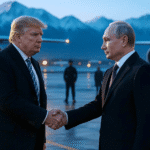In a dramatic decision that reverberated across Southeast Asia, Thailand’s Constitutional Court officially removed Prime Minister Paetongtarn Shinawatra from office on August 29, 2025, following an ethics violation tied to a leaked phone call with Cambodian Senate President and former Prime Minister Hun Sen. The ruling, decided by a 6–3 majority, underscored deep-seated tensions between the populist Shinawatra political dynasty and Thailand’s conservative establishment.
The scandal centered on a June 15 private call between Paetongtarn and Hun Sen, during which she referred to him as “uncle”, criticized a Thai military commander, and appeared overly deferential amid rising border tensions with Cambodia. Hun Sen himself leaked the recording, first publishing it online and swiftly triggered outrage at home.
Public anger peaked as voices across Thailand condemned her conduct as a betrayal of national pride and military integrity. The incident also contributed to the Bhumjaithai Party’s withdrawal from her coalition in June, leaving her administration critically weakened.
On July 1, 2025, the Constitutional Court suspended Paetongtarn pending the ethics investigation; she was replaced briefly by Deputy Prime Minister Suriya Juangroongruangkit, and then by Phumtham Wechayachai, who took up the role of caretaker prime minister in early July.
Despite defending her remarks as a negotiation tactic intended to “save lives”, Paetongtarn was unable to stem the crisis. The court’s ruling made her the sixth leader connected to the Shinawatra faction, be it by blood or political affiliation to be removed by judicial or military action in the past two decades. Her father, Thaksin Shinawatra, was ousted in a coup in 2006; her aunt, Yingluck Shinawatra, was removed by the court in 2014; and others, including Somchai Wongsawat and real-estate executive Srettha Thavisin, also fell under judicial rulings.
With her dismissal, the Shinawatra dynasty’s political dominance appears in decline. Analysts suggest this ruling may mark a turning point in Thai politics, finally bending the long-running conflict between democratically elected Shinawatra-backed governments and establishment institutions like the royalist-aligned courts and military.
As caretaker, Acting Prime Minister Phumtham Wechayachai now oversees government operations while Parliament prepares to choose a new prime minister. The constitutional process restricts eligibility to candidates previously nominated in the last general election. With Paetongtarn and her predecessor both ousted, the only remaining Pheu Thai nominee is 77-year-old Chaikasem Nitisiri, a former attorney-general with lower public visibility.
Meanwhile, the Bhumjaithai Party now a pivotal power broker has signaled it may lead the formation of a new government, with its leader, Anutin Charnvirakul, actively courting allies and proposing the dissolution of Parliament within four months.
Public and international reactions were immediate. Large-scale protests broke out in Bangkok, with demonstrators decrying Paetongtarn’s remarks as dishonorable and demanding accountability. In the global arena, diplomatic partners like the United States emphasized continued alliance commitments, while ASEAN and other regional players called for political stability and respect for legal procedures.



















